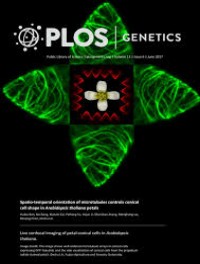PLoS Genetics Q1
 Unclaimed
Unclaimed
Genetics and genomics research has grown at a bewildering pace in the past 15 years. The techniques of these fields are being applied to a wealth of biological questions and experimental systems. PLOS Genetics reflects the full breadth and interdisciplinary nature of this research by publishing outstanding original contributions in all areas of biology. PLOS Genetics publishes human studies, as well as research on model organisms—from mice and flies, to plants and bacteria. It has an SJR impact factor of 1,945.
PLoS Genetics focuses its scope in these topics and keywords: signaling, gene, genetic, control, dna, essential, expression, genes, repair, rna, ...
Type: Journal
Type of Copyright: CC BY
Languages: English
Open Access Policy: Open Access
Type of publications:
Publication frecuency: -



2025 €
Inmediate OANPD
Embargoed OA- €
Non OAMetrics
1,945
SJR Impact factor282
H Index316
Total Docs (Last Year)1462
Total Docs (3 years)23799
Total Refs5755
Total Cites (3 years)1455
Citable Docs (3 years)3.48
Cites/Doc (2 years)75.31
Ref/DocOther journals with similar parameters
Molecular Cell Q1
Cell Research Q1
Annual Review of Plant Biology Q1
Cell Host and Microbe Q1
Annual Review of Medicine Q1
Compare this journals
Aims and Scope
Best articles by citations
Identification of the Imprinted KLF14 Transcription Factor Undergoing Human-Specific Accelerated Evolution
View moreQuantitative Genomics of Aggressive Behavior in Drosophila melanogaster
View moreRepetitive Element-mediated Recombination as a Mechanism for New Gene Origination in Drosophila
View moreFrequency-Matching SNPs Reveals Extended Linkage Disequilibrium in Genic Regions
View moreMultiple-Pathway Analysis of Double Strand Break Repair Mutations in Drosophila
View moreTERT promotes epithelial proliferation through transcriptional control of a Myc- and Wnt-related developmental program
View moreA screen for recessive speciation genes expressed in the gametes of F1 hybrid yeast
View moreInvolvement of synaptonemal complex proteins in sex chromosome segregation during marsupial male meiosis
View moreTranscriptional profiling of aging in human muscle reveals a common aging signature
View moreGeneralized Analysis of Molecular Variance
View moreLifespan regulation by evolutionarily conserved genes essential for viability
View moreGenome-Wide Expression Profiling of the Arabidopsis Female Gametophyte Identifies Families of Small, Secreted Proteins
View moreA novel susceptibility locus for Crohn's disease identified by whole genome association maps to a gene desert on chromosome 5p13.1 and modulates the level of expression of the prostaglandin receptor EP4
View moreGenomic Variation in Rice: Genesis of Highly Polymorphic Linkage Blocks during Domestication
View moreSignalling pathways involved in adult heart formation revealed by gene expression profiling in Drosophila
View moreLinking Metabolic QTL with Network and cis-eQTL Controlling Biosynthetic Pathways
View moreGenome-wide Hierarchy of Replication Origin Usage in Saccharomyces cerevisiae
View moreRole of APOBEC3 in Genetic Diversity among Endogenous Murine Leukemia Viruses
View moreOverlapping functions of Argonaute proteins in patterning and morphogenesis of Drosophila embryos
View moreDominant-Negative CK2a Induces Potent Effects on Circadian Rhythmicity
View moreEuropean Population Substructure: Clustering of Northern and Southern Populations
View moreHuman Subtelomeric WASH Genes Encode a New Subclass of the WASP Family
View moreCorrection: Comparative Genomics of Emerging Human Ehrlichiosis Agents
View moreCorrection: COUP-TFII Mediates Progesterone Regulation of Uterine Implantation by Controlling ER Activity
View more
Comments